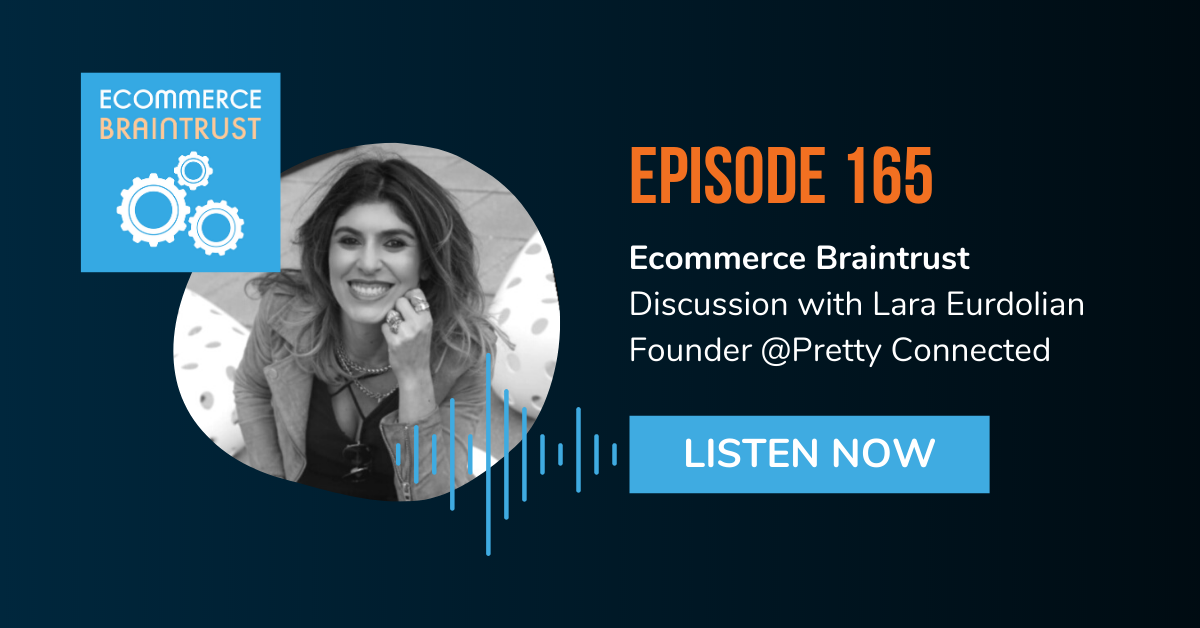It’s been said many times before but it bears repeating: video is becoming increasingly important for brands selling products online.
According to Zenith, the average person will spend a whopping 100 minutes each day watching online video in 2021. Brands that find effective ways to connect with consumers via video are poised to wrangle more and more market share from competitors.
Amazon Live is a video feature native to the Amazon marketplace that allows brand owners to broadcast live on Amazon, showcase their product line, answer questions from viewers in real-time and promote products directly to viewers. Brands can use in-house talent to run Amazon Live broadcasts, or they can choose to hire third-party influencers to promote their products.
In Episode 165 of the Ecommerce Braintrust podcast, influencer and Amazon Live expert Lara Eurdolian shared her thoughts about how brands can get the most out of video on Amazon. We’ve compiled all of the key takeaways from the discussion below.
Rise of Video Marketing
According to Lara, online video marketing is effective because it’s more personal, dynamic and expressive compared to other digital promo strategies. It also allows brands to connect with shoppers at different phases of the purchase funnel.
For example, one of Lara’s 61k Instagram followers (IG handle is @prettyconnected) could discover a cool new product through one of her informal Insta stories. A couple of weeks later, the same follower may notice that Lara is doing an Amazon Live about the product in question, and tune in to the broadcast to learn more.
Amazon Live – A New Frontier
Amazon Live is fantastic for brands because the platform is very easy to use. It’s free and the technical barriers to entry are low, so even if a brand has limited video marketing experience, there’s nothing stopping them from running awesome broadcasts on the Amazon channel.
To set up a broadcast, brands simply download the Amazon Live Creator app, decide upon a date and time, and then select products that will be featured in the livestream. What’s great is that you’re able to load up all the pricing and promo details in your product carousel. This makes presenting the livestream straightforward (especially if you’re working with an influencer who may not know your product line intimately).

And there’s no reason to worry about striving for some type of slick, expensive video production. In Lara’s opinion the ‘selfie’ model (one person talking directly into their cell phone or laptop) works really well for Amazon Live. The primary goal should be to get customers excited about the products on offer and telling the brand story in a compelling way.
Check out Bobsled’s Amazon Livestream Overview For Brands
Two Types of Amazon Live Strategy
There are two main styles of livestreams on Amazon:
1) Brand selling their products themselves
The pros of this model is that in-house talent generally understands the nuances of your product line really well, and you can keep your Amazon Live investment lean by not spending any marketing budget on an influencer.
The downsides are that although members of your team may know your product line really well, they may not be able to sell the product effectively during a livestream. There is also the problem of eyeballs – smaller brands have limited organic reach, whereas established influencers can boost views significantly.
2) Influencers selling products on behalf of a brand
The advantages of this model is that influencers are media professionals who can deliver very engaging broadcasts, they are likely to have creative ideas that will gel with the Amazon Live format, and they have a loyal audience of followers who may be discovering your brand for the first time.
The cons are that established influencers will likely charge for their time and efforts, you may pick the wrong type of influencer to work with, and they may not understand all the specifics of your product line.
How Long Should An Amazon Live Broadcast Be?
Common sense should prevail when it comes to broadcast duration. Try and figure out what would be compelling content for your audience and work backwards from there.
For example, fitness enthusiasts would be likely to watch a complete 30-45 minute workout video that showcases some training apparel in action. Foodies would be interested in watching a pro chef consult a new cookbook to crank out a 20 minute recipe. But if you’re selling a laptop bag, it's highly unlikely you’re going to need more than 5 minutes.
How Do Brands Find Influencers?
Lara’s advice for marketing professionals is to make a note of which influencers made an impression on them personally, and then make an assessment about whether there’s good synergy in terms of personality and audience for the product line that needs to be promoted. Finding the right influencer is an important undertaking, and it’s not something you want to rush.

She also encourages brands to harness the power of the Direct Message to connect with big names that are seemingly out of your reach. A simple DM on Instagram or Facebook could land you the influencer of your dreams!
How Do Brands Pay Influencers?
There is no one-size-fits-all model when it comes to brands partnering with influencers.
Firstly, brands need to decide whether you want to hire an influencer solely for an Amazon Live broadcast, or whether the deal will include the influencer promoting the products through their own social media channels as well. The deal set-up will inform compensation, so kicking things off with a simple one-off promo rather than getting into bed with a long-term deal is generally a good idea.
Influencers will use the Amazon Associates affiliate marketing program if they’re going to be promoting the products through their own channels. However, commission percentages are pretty low, so unless a product is guaranteed to sell thousands of units, most established influencers will expect some type of additional compensation for their work.
The upside for brands selling on Amazon is that influencers are becoming increasingly aware of how loyal Prime customers are. There are way less barriers to a sale on Amazon vs a sale through an unproven third-party website, so if an influencer understands that you have a well-maintained Amazon presence, they are far more likely to jump on board.

